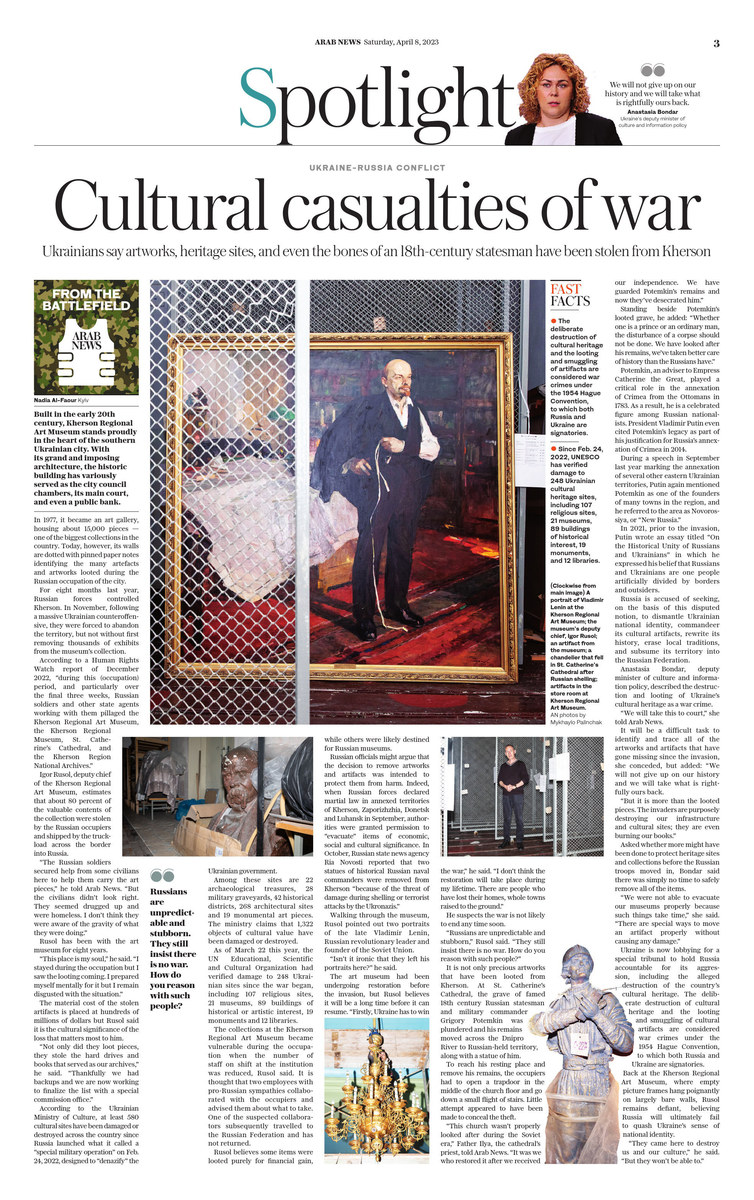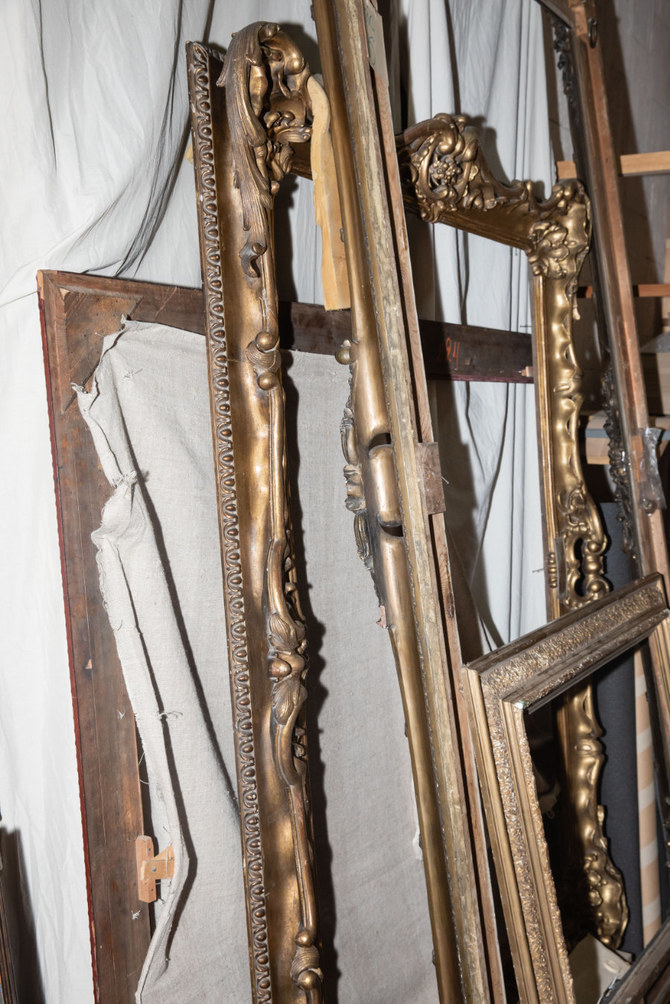KHERSON: Built in the early 20th century, Kherson Regional Art Museum stands proudly in the heart of the southern Ukrainian city. With its grand and imposing architecture, the historic building has variously served as the city council chambers, its main court, and even a public bank.
In 1977, the building became an art gallery, housing about 15,000 pieces — one of the biggest art collections in the country. Today, however, its walls are dotted with pinned paper notes identifying the many artworks looted during the Russian occupation of the city.
For eight months last year, Russian forces controlled Kherson. In November, following a massive Ukrainian counteroffensive, they were forced to abandon the territory but not without first removing thousands of exhibits from the museum’s collection.
According to a Human Rights Watch report of December 2022, “during this (occupation) period, and particularly over the final three weeks, Russian soldiers and other state agents working with them pillaged the Kherson Regional Art Museum, the Kherson Regional Museum, St. Catherine’s Cathedral, and the Kherson Region National Archives.”
Igor Rusol, deputy chief of the Kherson Regional Art Museum, estimates that about 80 percent of the valuable contents of the collection were stolen by the Russian occupiers and shipped by the truckload across the border into Russia.
“The Russian soldiers secured help from some civilians here to help them carry the art pieces,” he told Arab News. “But the civilians didn’t look right. They seemed drugged up and were homeless. I don’t think they were aware of the gravity of what they were doing.”
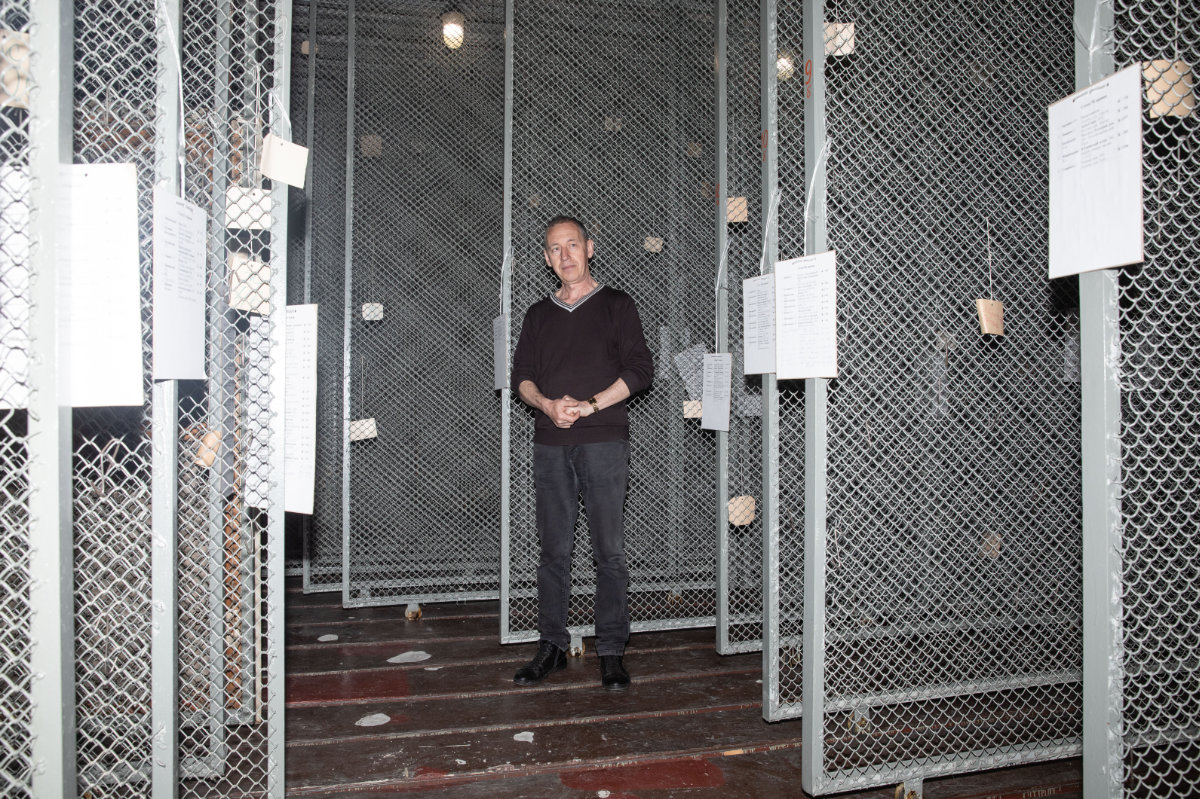
Igor Rusol, deputy chief of the Kherson Regional Art Museum, shows portions of the museum that had been emptied by Russian art looters. (AN photo by Mykhaylo Palinchak)
Rusol has been with the art museum for eight years. “This place is my soul,” he said. “I stayed during the occupation but I saw the looting coming. I prepared myself mentally for it but I remain disgusted with the situation.”
The material cost of the stolen artifacts is placed at hundreds of millions of dollars but Rusol said it is the cultural significance of the loss that matters most to him.
“Not only did they loot pieces, they stole the hard drives and books that served as our archives,” he said. “Thankfully we had backups and we are now working to finalize the list with a special commission office.”
According to the Ukrainian Ministry of Culture, at least 580 cultural sites have been damaged or destroyed across the country since Russia launched what it called a “special military operation” on Feb. 24, 2022, designed to “denazify” the Ukrainian government.
Among these sites are 22 archaeological treasures, 28 military graveyards, 42 historical districts, 268 architectural sites and 19 monumental art pieces. About 1,322 objects of cultural value have been damaged or destroyed.
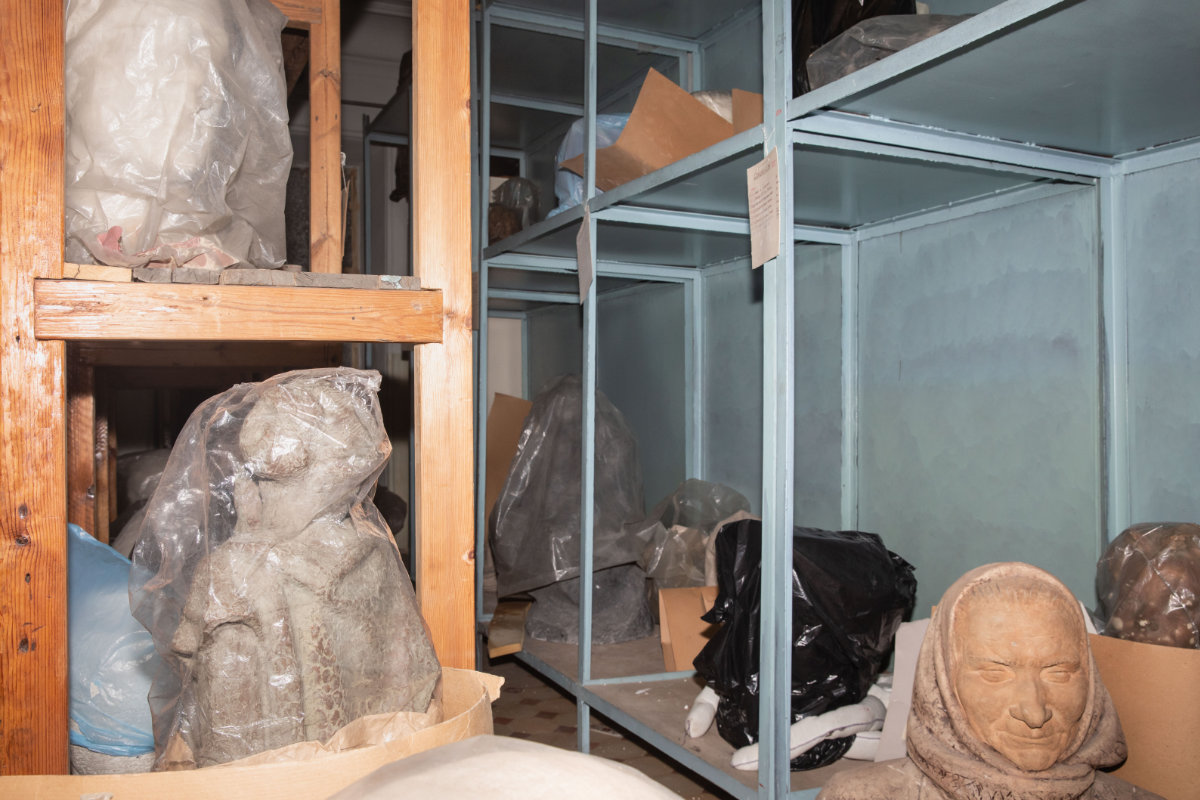
Museum officials believe some items were looted purely for financial gain, while others were likely destined for Russian museums. . (AN photo by Mykhaylo Palinchak)
As of March 22 this year, the UN Educational, Scientific and Cultural Organization had verified damage to 248 Ukrainian sites since the war began, including 107 religious sites, 21 museums, 89 buildings of historical or artistic interest, 19 monuments and 12 libraries.
The collections at the Kherson Regional Art Museum became vulnerable during the occupation when the number of staff on shift at the institution was reduced, Rusol said. It is thought that two employees with pro-Russian sympathies collaborated with the occupiers and advised them about what to take. One of the suspected collaborators subsequently moved to the Russian Federation and has not returned.
Rusol believes some items were looted purely for financial gain, while others were likely destined for Russian museums.
FASTFACTS
The deliberate destruction of cultural heritage and the looting and smuggling of artifacts are considered war crimes under the 1954 Hague Convention, to which both Russia and Ukraine are signatories.
Since Feb. 24, 2022, UNESCO has verified damage to 248 Ukrainian cultural heritage sites, including 107 religious sites, 21 museums, 89 buildings of historical interest, 19 monuments, and 12 libraries.
Russian officials might argue that the decision to remove artworks and artifacts was intended to protect them from harm. Indeed, when Russian forces declared martial law in annexed territories of Kherson, Zaporizhzhia, Donetsk and Luhansk in September, authorities were granted permission to “evacuate” items of economic, social and cultural significance. In October, Russian state news agency Ria Novosti reported that two statues of historical Russian naval commanders were removed from Kherson “because of the threat of damage during shelling or terrorist attacks by the Ukronazis.”
As he gave Arab News a tour of the art museum, Rusol pointed out two portraits of Vladimir Lenin, the Russian revolutionary leader and founder of the Soviet Union.
“Isn’t it ironic that they left his portraits here?” he said.
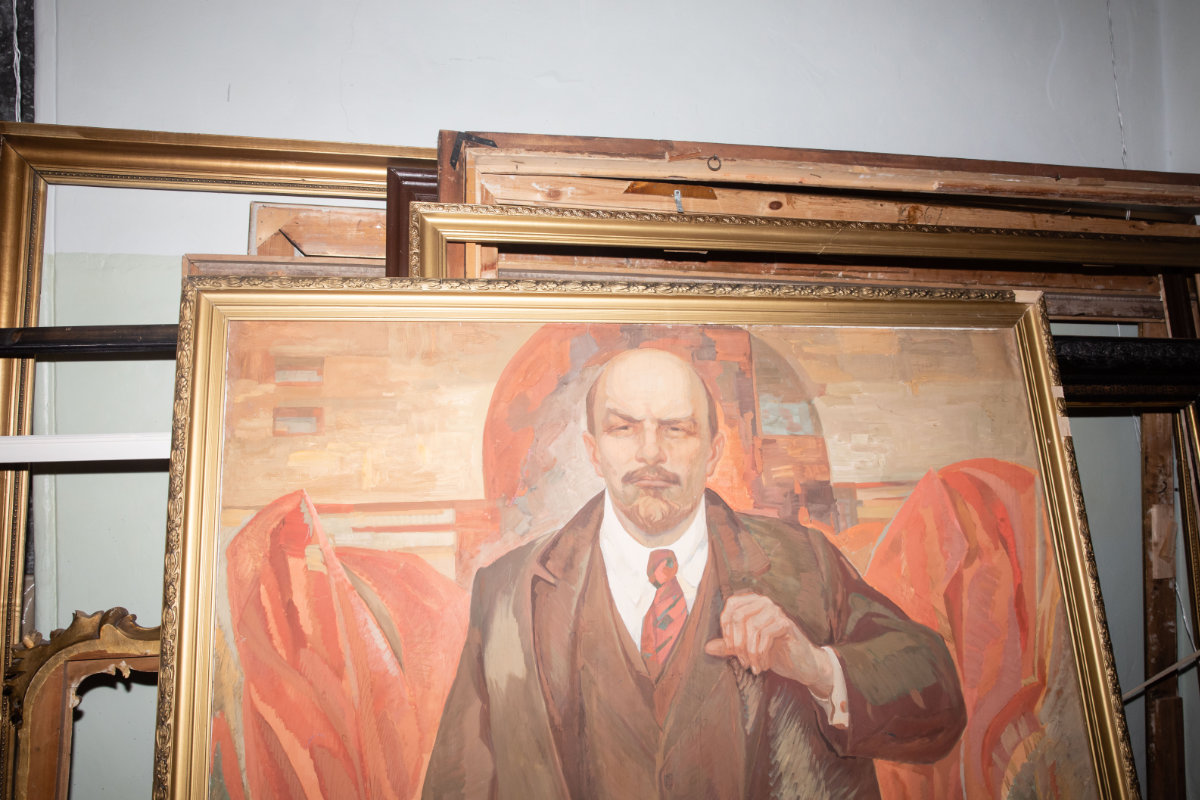
The Russian looters were not interested in the portraits of Vladimir Lenin, founder of the Soviet Union. (AN photo by Mykhaylo Palinchak)
The art museum had been undergoing restoration work before the invasion but, not surprisingly, the process has been put on hold. Rusol believes it will be a long time before it can resume.
“Firstly, Ukraine has to win the war,” he said. “I don’t think the restoration will take place during my lifetime. There are people who have lost their homes, whole towns raised to the ground.”
He suspects the war is not likely to end anytime soon.
“Russians are unpredictable and stubborn,” Rusol said. “They still insist there is no war. How do you reason with such people?”
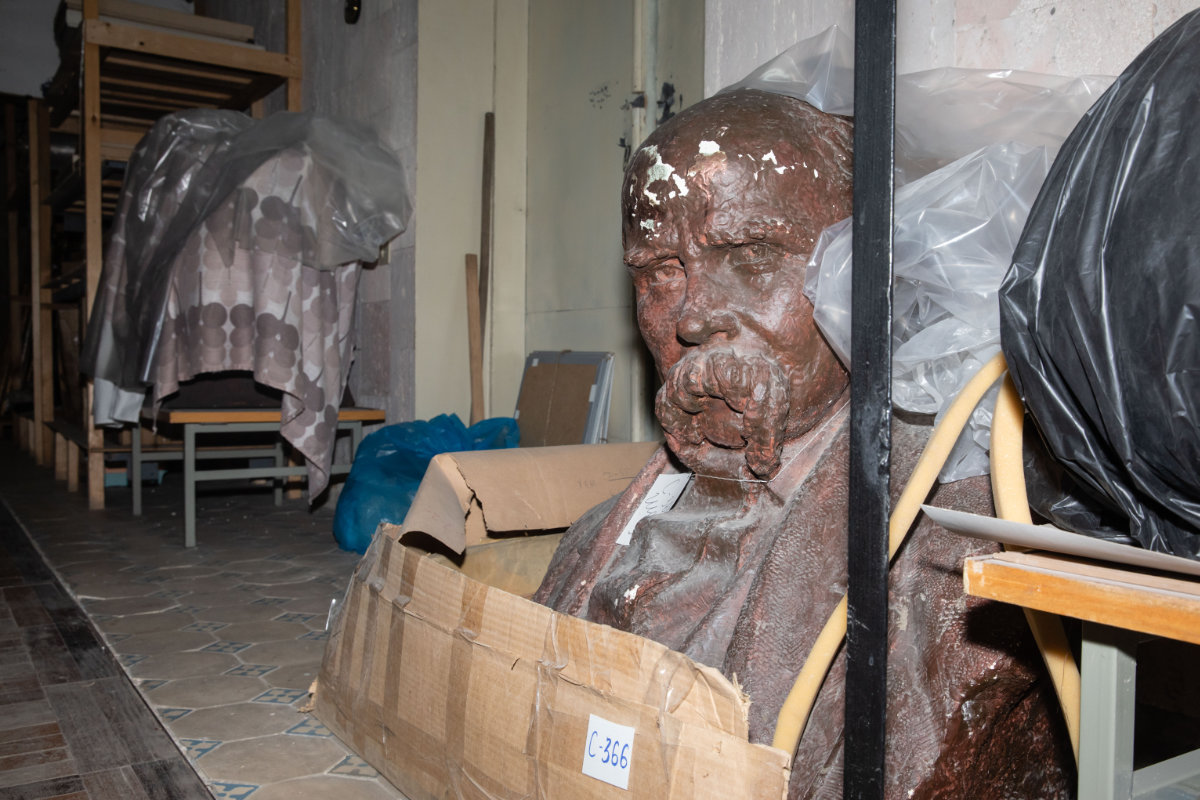
A bust of celebrated Ukrainian poet, Taras Shevchenko was among those left behind by looters. (AN photo by Mykhaylo Palinchak)
It is not only precious artworks that have been looted from Kherson. At St. Catherine’s Cathedral, the grave of famed 18th century Russian statesman and military commander Grigory Potemkin was plundered and his remains moved across the Dnipro River to Russian-held territory, along with a statue of him.
To reach his resting place and remove his remains, the occupiers had to open a trap door in the middle of the church floor and go down a small flight of stairs. Little attempt appeared to have been made to conceal the theft.
“This church wasn’t properly looked after during the Soviet era,” Father Ilya, the cathedral’s priest, told Arab News. “It was us who restored it after we received our independence. We have guarded Potemkin’s remains and now they’ve desecrated him.”
Standing beside Potemkin’s looted grave, Father Ilya added: “Whether one is a prince or an ordinary man, the disturbance of a corpse should not be done. We have looked after his remains, we have taken better care of history than the Russians have.”
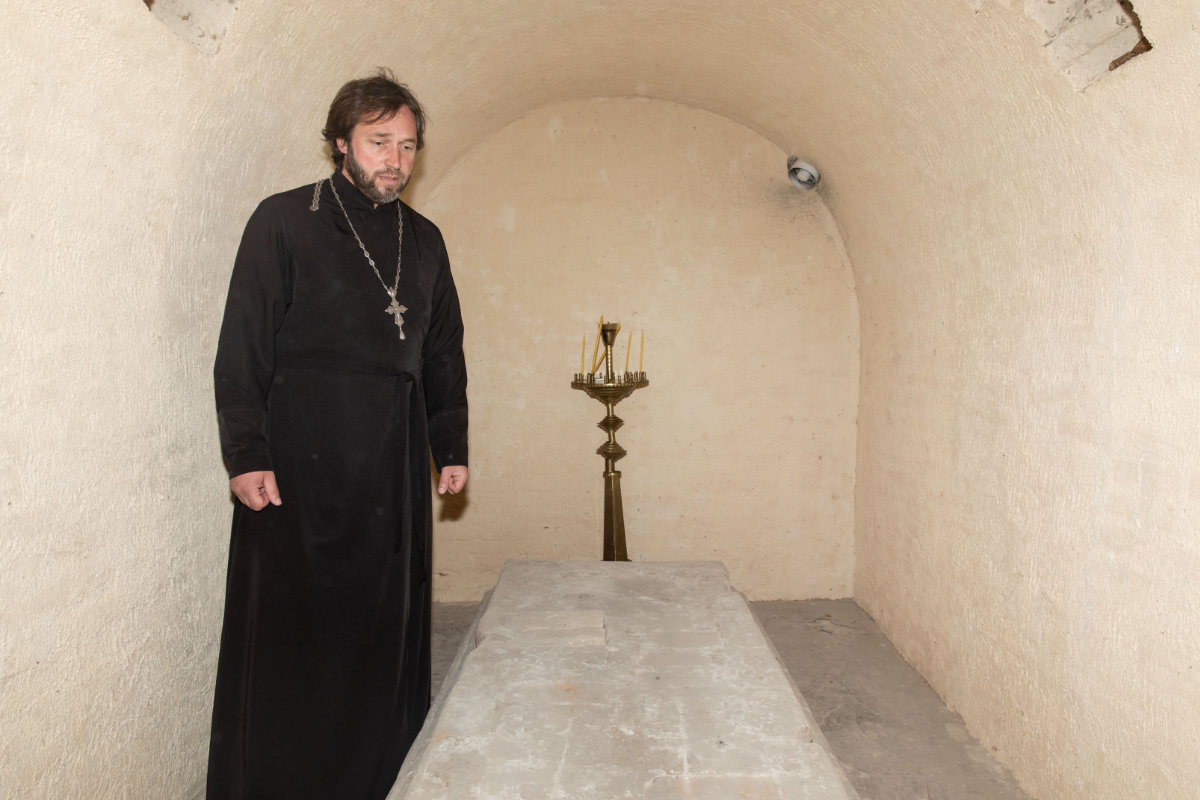
Father Ilya standing by the grave of Potemkin in Kherson's St Catherine's cathedral. (AN photo by Mykhaylo Palinchak)
Potemkin, an adviser to Empress Catherine the Great, played a critical role in the annexation of Crimea from the Ottomans in 1783. As a result, he is a celebrated figure among Russian nationalists. President Vladimir Putin even cited Potemkin’s legacy as part of his justification for Russia’s annexation of Crimea in 2014.
During a speech in September last year marking the annexation of several other eastern Ukrainian territories, Putin again mentioned Potemkin as one of the founders of many towns in the region, and he referred to the area as Novorossiya, or “New Russia.”
In 2021, prior to the invasion, Putin wrote an essay titled “On the Historical Unity of Russians and Ukrainians” in which he expressed his belief that Russians and Ukrainians are one people artificially divided by borders and outsiders.
Russia is accused of seeking, on the basis of this disputed notion, to dismantle Ukrainian national identity, commandeer its cultural artifacts, rewrite its history, erase local traditions, and subsume its territory into the Russian Federation.

Artefacts packaged at the storage room in Kherson Regional Art Museum. (AN photo by Mykhaylo Palinchak)
Anastasia Bondar, Ukraine’s deputy minister of culture and information, described the destruction and looting of her country’s cultural heritage as a war crime.
“We will take this to court,” she told Arab News.
It will be a difficult task to identify and trace all of the artworks and artifacts that have gone missing since the invasion, she conceded, but added: “We will not give up on our history and we will take what is rightfully ours back.
“But it is more than the looted pieces. The invaders are purposely destroying our infrastructure and cultural sites; they are even burning our books.”
Asked whether more might have been done to protect heritage sites and collections before the Russian troops moved in, Bondar said there was simply no time to safely remove all of the items.
“We were not able to evacuate our museums properly because such things take time,” she said. “There are special ways to remove an artifact properly without causing any damage to the piece.”
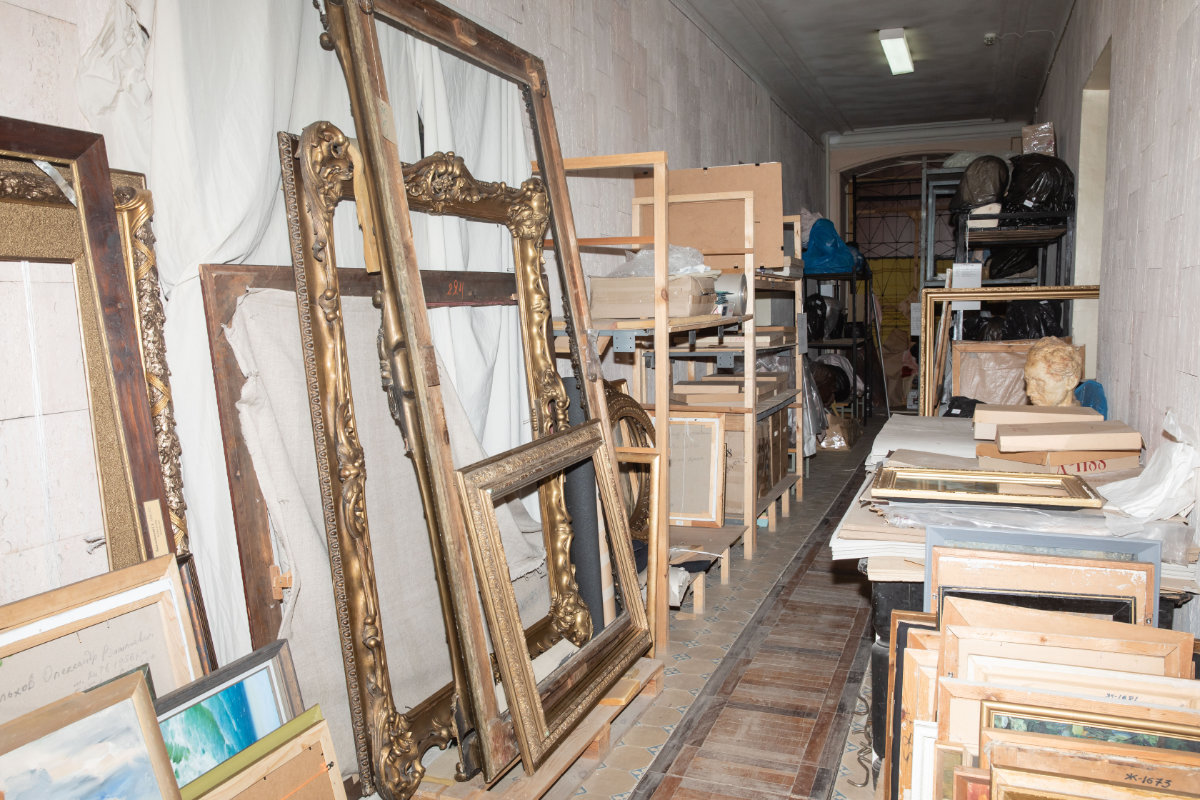
Frames emptied of paintings Russian looters are seen at the Kherson museum. (AN photo by Mykhaylo Palinchak)
Ukraine is now lobbying for a special tribunal to be established to hold Russia accountable for its aggression and its consequences, including the alleged destruction of cultural heritage.
The deliberate destruction of cultural heritage and the looting and smuggling of cultural artifacts are considered war crimes under the 1954 Hague Convention, to which both Russia and Ukraine are signatories.
Back at the Kherson Regional Art Museum, where empty picture frames hang poignantly on largely bare walls, Rusol remains defiant, believing Russia will ultimately fail to quash Ukraine’s sense of national identity.
“They came here to destroy us and our culture,” he said. “But they won’t be able to.”
